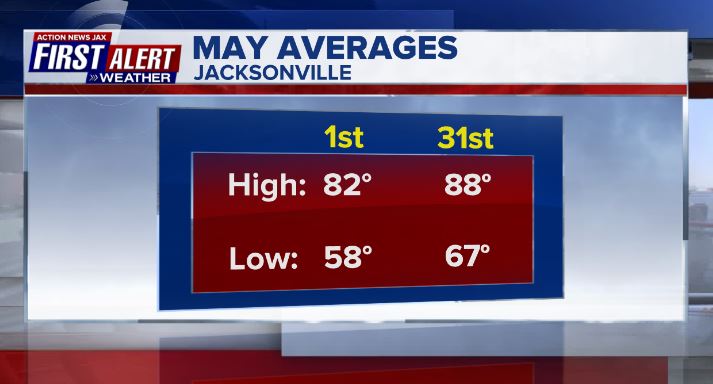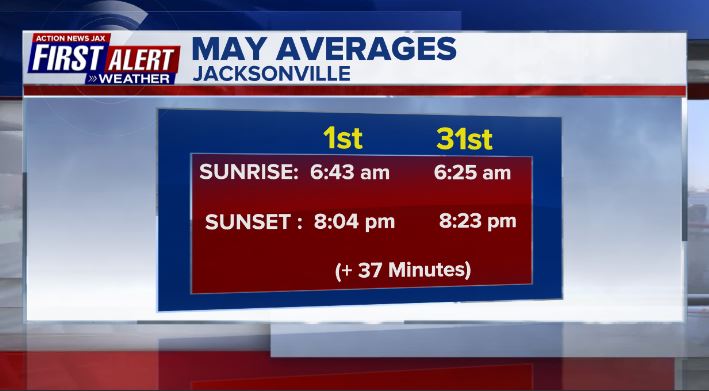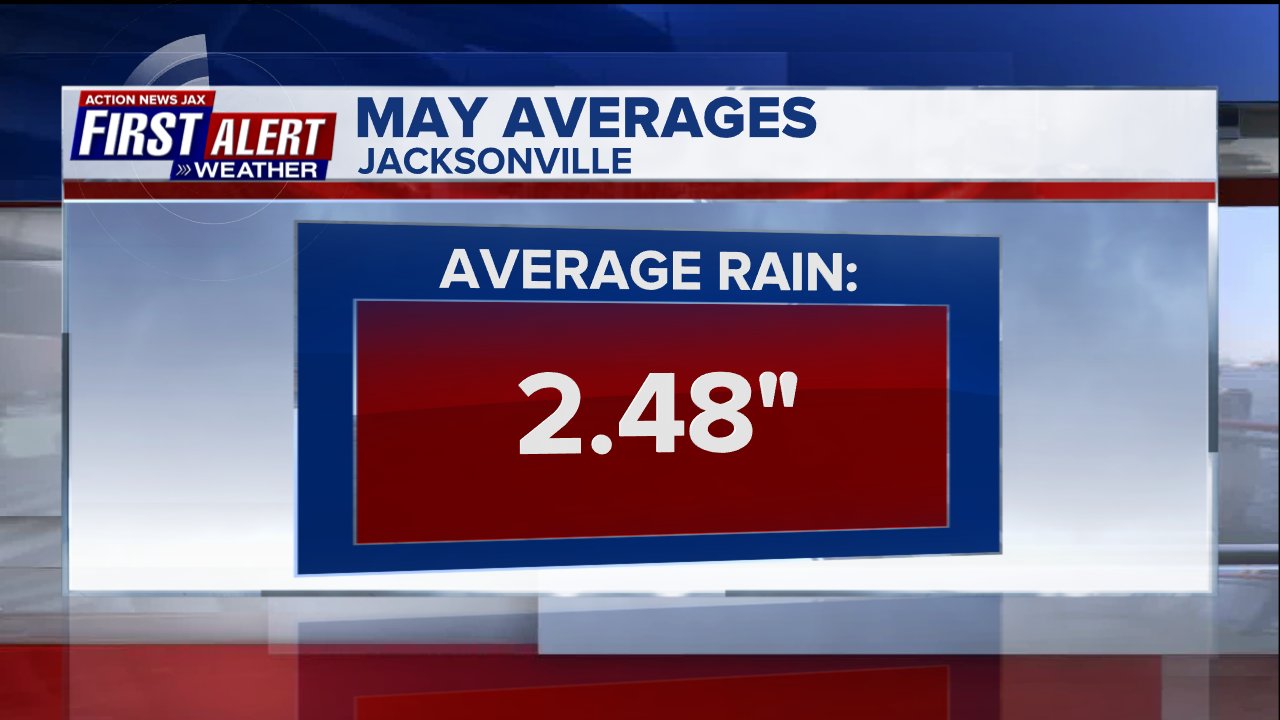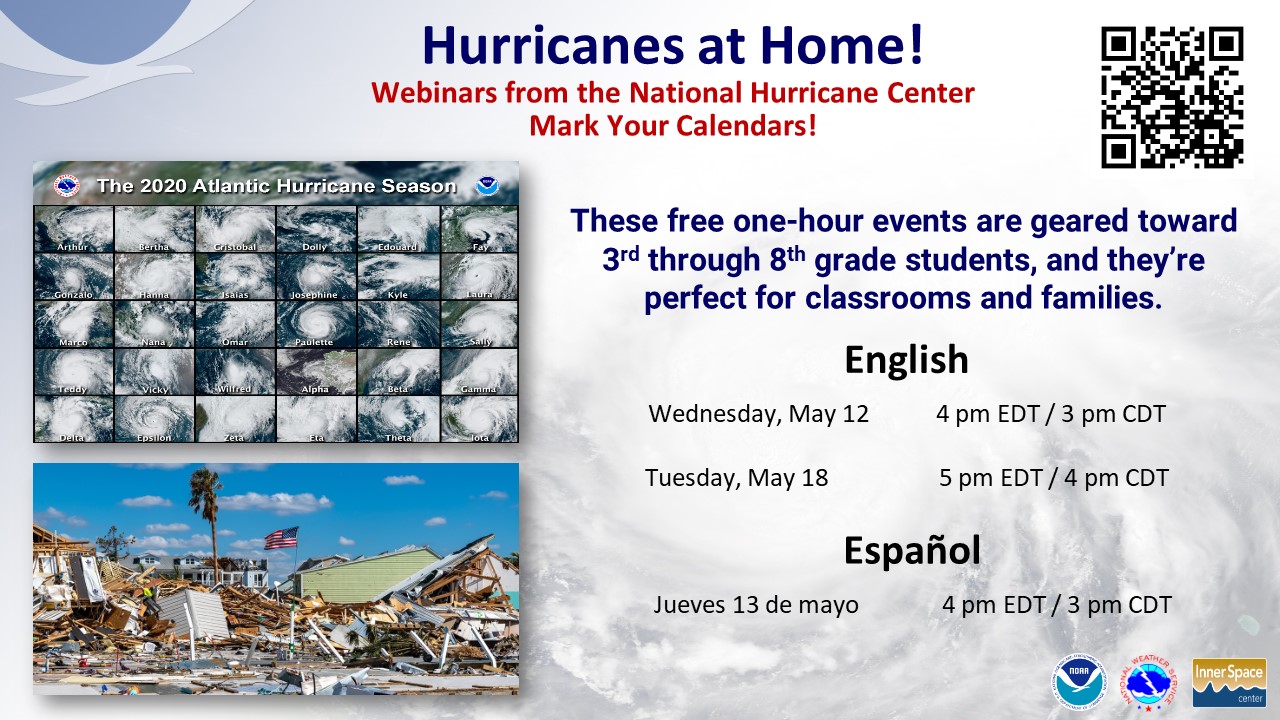Jacksonville, FL — Turning the calendars to May:
This is cool! Hurricane webinars from the NHC....
The National Hurricane Center will be conducting webinars about hurricanes that will focus on the job of a meteorologist, the weather hazards that come with hurricanes, and how meteorologists get you the weather information you need before a storm. These free one-hour events are geared toward 3rd through 8th grade students, and they’re perfect for classrooms and families. Webinars will be provided based on the schedule below, with registration links below:
English: 4 pm EDT Wednesday, May 12: Registration link: https://nhcwebinar12.eventbrite.com 5 pm EDT
Tuesday, May 18: Registration link: https://nhcwebinar18.eventbrite.com
Spanish: 4 pm EDT Thursday, May 13: Registration link: https://nhcwebinar13.eventbrite.com
Future info on the #HurricanesAtHome webinars will be available on NHC’s social media accounts:
Facebook - * here *..... Twitter - * here *
‘Tis the season for boating. The Water Sports Foundation offers the following:
12 Top Boating Safety Tips for the Busy Memorial Day Weekend … and Beyond
Boater Safety is Paramount with Increased Boating Activity

ORLANDO, Fla, April 27, 2021 – With new and used boat sales soaring to record highs in 2020 to first-time boat buyers, boating safety stakeholders are taking extra measures to communicate and promote safe boating messages prior to the busy Memorial Day holiday and the unofficial launch of the summer boating season.
“The pandemic literally saw hundreds of thousands of newcomers join the ranks of first-time boat owners, so we’re taking extra precautions to pro-actively share safe boating strategies,” said Water Sports Foundation Executive Director Jim Emmons. “We’ve identified a dozen top tips for keeping boaters safe that we believe can positively impact boater safety while maximizing enjoyment on the nation’s waterways over this holiday season, and beyond.”
#1 – Education & Essential Equipment
Before launching your boat, be sure you are confident and comfortable at the helm, following successful completion of a boating safety education course. If you haven’t already done so, enroll in a boating class taught by qualified and certified boating safety instructors, preferably with curriculum that meets approved American National Standard for on-water skills training.
There are many live, virtual and hybrid boating safety education classes available through the U.S. Coast Guard auxiliary, Power Squadron/America’s Boating Club and any number of private boating education providers. For a list of educational resources, check out the National Boating Safety Media Resource Center: Boating Safety Education – Water Sports Foundation
Besides safe boating operation, make sure you are familiar with the operating instructions of your vessel. Check your equipment prior to departure to ensure all are in proper working condition. Make sure you are competent to operate a VHF radio, and if possible, an EPIRB or personal locator beacon.
#2 - Life Jackets Save Lives – Wear Them!
It’s a fact: drowning is the cause of death in 79 percent of fatal boating accidents where the cause of death was known; 86 percent of those drowning victims were not wearing life jackets.
Make sure your boat is equipped with U.S. Coast Guard approved life jackets for all passengers and they are sized to fit: Choosing the Right Life Jacket – Water Sports Foundation. There are many attractive styles and designs now available for different types of boating activities. Check your state law for mandates regarding life jacket usage and age requirements for children: NASBLA Life Jacket Requirements by State and Age.
#3 - Don’t Drink and Drive!
When you mix sun, wind, water and waves with alcohol, you create a dangerous situation that can lead to disaster. According to U.S. Coast Guard reports, alcohol use is the leading known contributing factor in fatal boating accidents; where the primary cause was known, it was listed as the leading factor in 23% of deaths.
For the safety of your friends and family, we recommend avoiding alcohol altogether while boating, or at the very least, taking the pledge and designate a “Sober Skipper:” Video: Designated Sober Skipper – Family – Water Sports Foundation
#4 - Engage the ECOS!
As of April 1, 2021, a federal law was enacted that requires the use of an engine cut off switch (ECOS), an onboard safety device that is connected to the boat’s captain. Should the driver fall out of the boat, the ECOS will immediately stop the boat’s engine. Wireless versions are also available for active captains. All About Engine Cut-Off Switches: The $20 Device that Saves Boater’s Lives Is Now Required By Federal Law – Water Sports Foundation
#5 - File a Float Plan!
Before departing from your dock of choice, file a float plan with friends, family members and/or your marina that communicates the names of all aboard with contact information including cell phone numbers; your destination with a planned itinerary and stops along the route; and your estimated return time. Should you fail to return as planned, your information will be readily accessible to facilitate any search activity.
#6 – Be a Weather Watcher!
Be smart and plan your boating activity according to weather forecasts and conditions. Check weather in advance and continually monitor using available mobile APPS. Storms, lightning, changing tides, currents, winds and other inclement weather conditions can endanger the safety of boaters.
Should you be on a boat when mother nature unleashes her fury, find shelter as soon as possible. If your situation and plans change due to weather, be sure to contact those with whom you filed your float plan regarding plan modifications.
#7 – Pre-Departure Communication!
Before getting underway, make sure the captain has clearly communicated safety information and ground rules with all passengers, including children. For example, this should include instructing everyone to remain seated at all times while the boat is underway, instruction regarding life jacket usage and throw cushion access, appointing observers to help watch for oncoming boat traffic or to monitor watersports activities, among other pertinent details.
NOTE: every passenger should have a designated seat inside the boat and should be safely secured while underway.
#8 – Comply with Your Boat’s Capacity!
Every boat includes a designated maximum capacity rating. Be sure to know this requirement and to follow recommendation to prevent overloading and potentially capsizing your boat. Consider not only the weight of passengers, but also gear, coolers, water toys and other carry-ons.
#9- Be Careful … Pay Attention!
A vast number of boating accidents are attributed to operator distraction or inattention. The designated driver needs to be vigilant and to take responsibility for the safety of those on his vessel. Continually “sweep” the horizon and carefully watch and anticipate boating activity.
#10 – Choose Destinations Wisely!
If you’re new to boating with limited experience, don’t choose the busiest boating day of the year to travel to the most populated hotspot for boaters in the area. The ability to safely navigate, drop and set anchors and lines in confined spaces is exacerbated in close quarters. Choose a less congested venue and save the popular boating hub for a more manageable outing.
#11 – Follow Posted Speed Limits and No Wake Zones!
Be aware of established speed limits and no wake zones; respond accordingly. The fastest way to get a ticket and incur fines is to violate these laws which are established to keep boaters safe.
#12 – Nighttime Boating Activity!
Holidays often feature fun events like firework shows and raft ups. While this can be a blast, there is additional danger associated with boating after sunset when visibility is restricted.
Boating traffic on the waterways, at area ramps and marinas is often heavily congested during holiday events, so slow down and use extra precautions. Make sure all your navigation and running lights are operational. Avoid drinking alcohol which can further impair your senses and visibility. Be extremely vigilant to watch for inexperienced boaters or those who may be operating under the influence.
BONUS TIP: Download the Coast Guard Boating Safety Mobile App!
If you want to know the latest safety regulations or navigation rules, need to access the weather report from the nearest NOAA buoys, or access any number of awesome boating safety information, download the Coast Guard boating safety mobile app available for free on iOS and Android devices: https://uscgboating.org/mobile
Friday, April 30th is ‘National Arbor Day’. The one & only Patty Scott offers the following:
As you well know, trees provide many important economic, environmental and aesthetic benefits. (Facts from Arbor Day Foundation Web site)
They help:
Slow and filter stormwater runoff - the planting of trees means improved water quality, resulting in less runoff and erosion. This allows more recharging of the ground water supply. Wooded areas also help prevent the transport of nutrients, sediment and chemicals into streams, lakes, and rivers.
Help save energy — Trees properly placed around buildings can reduce air conditioning needs by 30% and can save 20-50% in energy used for heating.
Cleanse the air- Trees remove pollution from the atmosphere, improving air quality and human health.
Reduce urban heat islands- Trees cool the city by up to 10 degrees F by shading our homes and streets and releasing water vapor into the air though their leaves.
Enhance property values — Landscaping, especially with trees, can increase property values as much as 20 percent.
Help fight climate change — Trees absorb carbon dioxide (CO2), removing and storing the carbon, while releasing oxygen back into the air.
Beautify and enhance communities - Trees can be a stimulus to economic development, attracting new businesses and tourism. Commercial retail areas are more attractive to shoppers, apartments rent more quickly, tenants stay longer, and space in a wooded setting is more valuable to sell or rent.
Reduce stress- in laboratory research, visual exposure to settings with trees has produced significant recovery from stress within five minutes, as indicated by changes in blood pressure and muscle tension.
Provide habitat for wildlife.
The Arbor Day Foundation has a cool idea to celebrate this national day dedicated to trees - click * here *.
SHARE YOUR
#ARBORDAY
During the week of Arbor Day, your social post can turn into trees planted! The Arbor Day Foundation will plant one tree for EACH Instagram, Twitter, or Facebook user who posts a picture of a tree using the hashtag #ArborDay, up to 50,000 trees. What’s more, Peanuts is matching the trees planted, so we can plant up to 100,000 trees.

Cox Media Group
:quality(70)/cloudfront-us-east-1.images.arcpublishing.com/cmg/4BY52YP3URHB3CBG6342FEUNGQ.jpg)




:quality(70)/d1hfln2sfez66z.cloudfront.net/11-14-2024/t_75d771a9d1f14e468afa4d3992fe0afb_name_file_960x540_1200_v3_1_.jpg)
:quality(70)/cloudfront-us-east-1.images.arcpublishing.com/cmg/OU464JRFJVA6VBJJRLEIS3WXMU.jpg)
:quality(70)/cloudfront-us-east-1.images.arcpublishing.com/cmg/RHOYTBY4INEH7OIJUHJMEXR7OU.jpg)
:quality(70)/d1hfln2sfez66z.cloudfront.net/11-12-2024/t_2592655d00a246bea1bea00831520bea_name_file_960x540_1200_v3_1_.jpg)
:quality(70)/cloudfront-us-east-1.images.arcpublishing.com/cmg/3CULOC2AJVARFBUFL5XRFGJQWA.jpg)